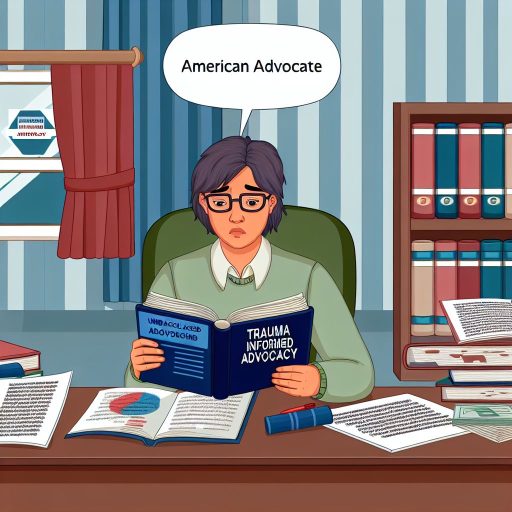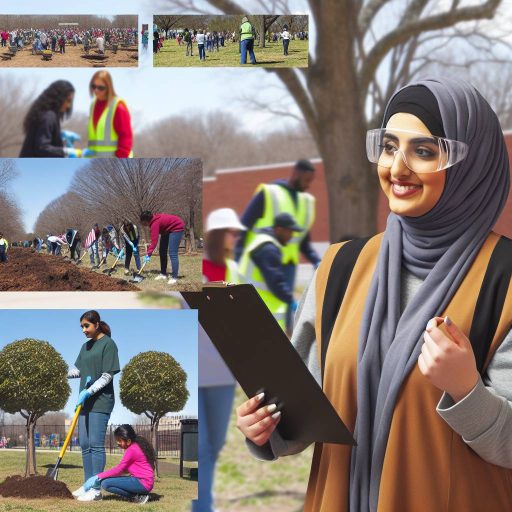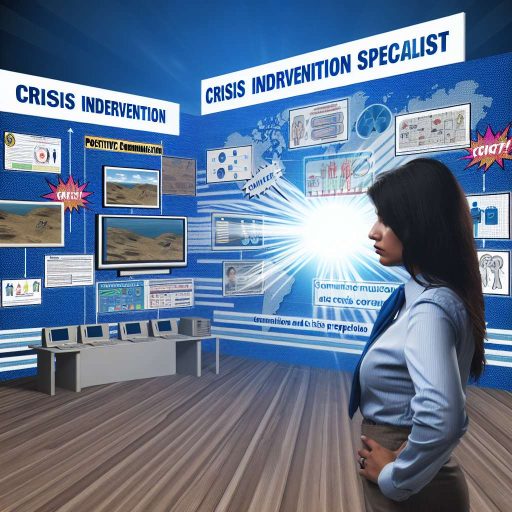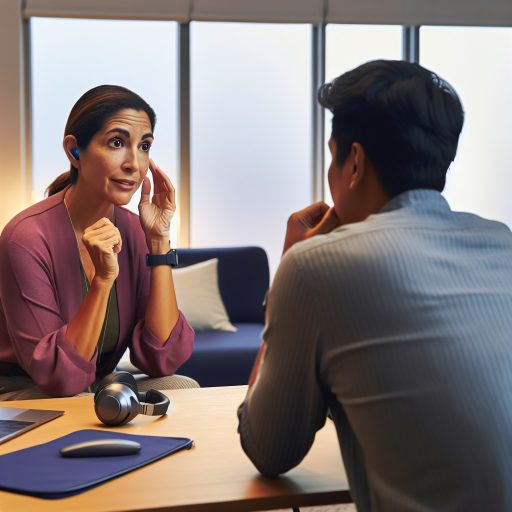Role of Disability Services Coordinators
Disability Services Coordinators facilitate accommodations for students with disabilities at universities.
They ensure equal access to education for all students, regardless of their disabilities.
Importance of their Role
Disability Services Coordinators empower individuals with disabilities to thrive in academic settings.
They advocate for inclusive practices and accommodations that promote student success.
Disability Services Coordinators play a vital role in creating an inclusive and accessible environment for individuals with disabilities in educational settings.
Their dedication and support are essential in ensuring that all students have equal opportunities to learn and succeed.
Understanding Disability Rights and Advocacy
As a disability services coordinator, it is essential to have a strong understanding of disability rights and advocacy.
Knowledge of Laws and Regulations Related to Disabilities
- Stay updated on the Americans with Disabilities Act (ADA) and Section 504 of the Rehabilitation Act.
- Understand how these laws apply to higher education and the rights they afford to students with disabilities.
- Be aware of state and local laws that may impact the services and accommodations provided to students.
Advocacy for Individuals with Disabilities within the Organization
- Ensure that all policies and procedures within the organization are inclusive and accessible.
- Advocate for the needs of students with disabilities in meetings and decision-making processes.
- Collaborate with other departments to create a supportive and inclusive environment for students with disabilities.
By having a strong foundation in disability rights and advocacy, disability services coordinators can effectively support students with disabilities and ensure they have equal access to education.
Building Relationships with Students:
Establishing trust and rapport with students.
Creating a welcoming and inclusive environment for students with disabilities.
Establishing Trust and Rapport with Students:
Actively listen to students’ needs and concerns.
Demonstrate empathy and understanding towards their challenges.
Be approachable and available for communication at all times.
Respect their privacy and confidentiality in all interactions.
Collaborate with students to co-create solutions and accommodations.
Creating a Welcoming and Inclusive Environment for Students with Disabilities:
Provide a physical space that is accessible and accommodating.
Train staff and faculty on inclusive practices and awareness.
Offer a variety of resources and support services tailored to their needs.
Encourage peer support and engagement through disability affinity groups.
Celebrate and showcase the achievements and contributions of students with disabilities.
Transform Your Career Today
Unlock a personalized career strategy that drives real results. Get tailored advice and a roadmap designed just for you.
Start NowUltimately, building strong relationships with students and creating an inclusive environment are crucial aspects of the role of a disability services coordinator.
By prioritizing trust, empathy, and inclusivity, coordinators can positively impact the academic and personal success of students with disabilities.
Find Out More: Human Services Assistant: Impact on Community Welfare
Collaborating with Faculty and Staff:
Communication with faculty is crucial to ensure students’ needs are met effectively.
It is important for disability services coordinators to establish good relationships with faculty.
Regular meetings with faculty can help in discussing accommodations and student progress.
Provide faculty with information on the specific needs of students with disabilities in their classes.
Collaborating with Staff:
Work closely with staff members to support students in various aspects of campus life.
Coordinate with residence hall staff to ensure accessibility for students with disabilities.
Train staff members on how to assist students with disabilities in emergency situations.
Collaborate with career services staff to provide job placement assistance for students with disabilities.
See Related Content: The Role of Life Skills Instructors in Crisis Management
Providing Accommodations and Support:
Conducting assessments to determine students’ needs.
Implementing appropriate accommodations and support services.
Assessing Students’ Needs:
- Meet with students to discuss their disabilities and challenges.
- Review documentation from medical professionals or previous accommodations.
- Conduct disability assessments to identify specific academic or support needs.
- Collaborate with faculty to gather insights on students’ performance in classes.
Implementing Accommodations and Support Services:
- Customize accommodation plans based on the assessed needs of students.
- Provide assistive technology, note-taking services, or extended time for exams.
- Ensure accessibility in classrooms, libraries, and other campus facilities.
- Train faculty and staff on how to support students with disabilities.
Regular Monitoring and Adjustments:
- Schedule regular check-ins with students to evaluate the effectiveness of accommodations.
- Gather feedback from students on their experiences with provided support services.
- Be open to making adjustments based on students’ evolving needs or feedback.
- Collaborate with faculty to address any challenges or concerns regarding accommodations.
Building Partnerships and Resources:
- Establish partnerships with local disability service organizations for additional support.
- Provide students with information on external resources and community services.
- Collaborate with career services for guidance on future job accommodations.
- Stay updated on current trends and best practices in disability services through professional development.
Explore Further: Key Responsibilities of a Disability Services Coordinator
Developing Individualized Plans:
- Creating individualized plans for students with disabilities
- Monitoring progress and adjusting plans as needed
One of the key responsibilities of disability services coordinators is to develop individualized plans for students with disabilities.
These plans are crucial in ensuring that each student receives the support and accommodations they need to succeed in their academic pursuits.
When creating individualized plans, it is important to work closely with each student to identify their specific needs and goals.
This may involve conducting assessments, reviewing documentation from healthcare providers, and gathering input from teachers and other stakeholders.
Once the individualized plan is in place, it is essential to monitor the student’s progress on a regular basis.
Transform Your Career Today
Unlock a personalized career strategy that drives real results. Get tailored advice and a roadmap designed just for you.
Start NowThis can be done through ongoing communication with the student, their instructors, and any other involved parties.
By tracking progress, disability services coordinators can identify areas where the student may need additional support or adjustments to their plan.
Adjusting the individualized plan as needed is a critical part of the process.
Students with disabilities may experience changes in their needs over time, so it is important to be flexible and willing to make modifications as necessary.
This could involve adding new accommodations, changing deadlines, or exploring different resources to support the student’s success.
By developing individualized plans, monitoring progress, and adjusting plans as needed, disability services coordinators play a vital role in supporting students with disabilities on their academic journey.
Through these efforts, students can receive the tailored support they need to thrive in their educational pursuits.
See Related Content: Community Health Workers in Rural vs. Urban Areas
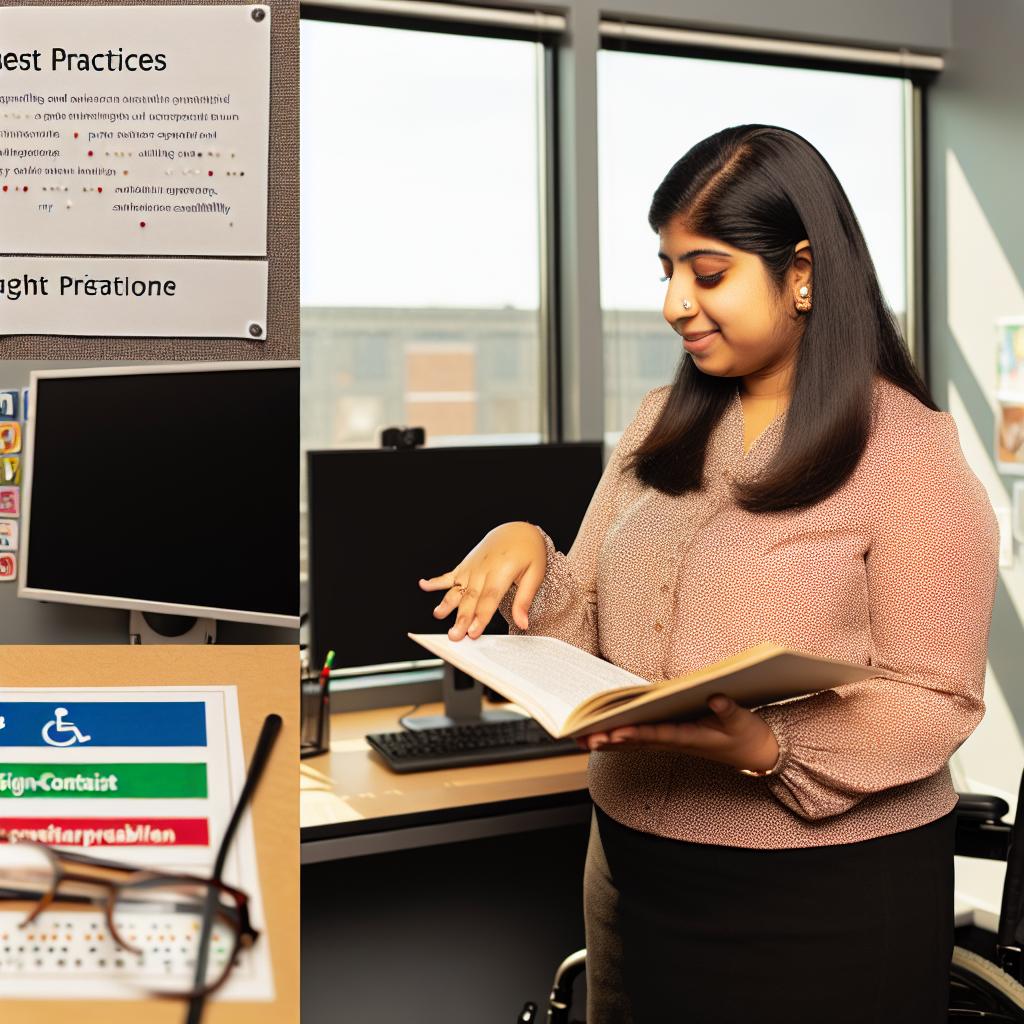
Offering Education and Resources:
Provide information and resources on disabilities to students and staff.
Educate students, faculty, and staff on disability awareness and inclusion.
As a Disability Services Coordinator, one of your key responsibilities is to offer education and resources to the campus community. By providing information on various disabilities and resources available, you are equipping individuals with the knowledge they need to better understand and support those with disabilities.
Here are some best practices to consider when offering education and resources:
Provide Comprehensive Information:
- Ensure that information on different types of disabilities is readily available.
- Include resources for students, faculty, and staff to access for further learning.
It is essential to provide comprehensive information that covers a wide range of disabilities. This will help individuals gain a better understanding of the diverse needs within the disability community and promote a more inclusive environment.
Conduct Training Workshops:
- Organize workshops for students, faculty, and staff on disability awareness.
- Include topics on creating an inclusive and accessible campus environment.
Training workshops are a valuable tool for educating individuals on disability-related issues. These workshops can cover topics such as communication strategies, reasonable accommodations, and creating a welcoming environment for all students.
Collaborate with Disability Organizations:
- Partner with local disability organizations to access expert resources.
- Invite guest speakers from disability advocacy groups to share insights.
Collaborating with disability organizations can provide valuable resources and insights that can enhance your education efforts. Guest speakers from these organizations can offer firsthand experiences and practical advice to the campus community.
Promote Accessibility Resources:
- Highlight campus accessibility resources in your educational materials.
- Encourage students with disabilities to utilize available support services.
It is essential to promote accessibility resources and support services available on campus. By raising awareness and encouraging students with disabilities to seek help when needed, you are fostering a supportive and inclusive learning environment.
Evaluate Education Programs:
- Collect feedback from participants to assess the effectiveness of education programs.
- Use evaluations to make improvements and tailor future education initiatives.
Evaluating the success of your education programs is crucial for continuous improvement. By gathering feedback from participants and making necessary adjustments, you can ensure that your efforts are impactful and relevant to the campus community.
By offering education and resources on disabilities, you are empowering individuals to become advocates for inclusivity and support for those with disabilities. Implementing these best practices will help create a more understanding and supportive campus environment for all students, faculty, and staff.
Ensuring Accessibility:
As a disability services coordinator, one of the key responsibilities is to ensure that the campus is physically accessible to all individuals with disabilities.
This includes making sure that there are ramps, elevators, and accessible parking spaces available.
Transform Your Career Today
Unlock a personalized career strategy that drives real results. Get tailored advice and a roadmap designed just for you.
Start NowTo promote accessibility, it is essential to provide technology and resources that cater to the specific needs of students with disabilities.
This can include screen readers, magnifiers, and adaptive software that enable students to access educational materials and participate in academic activities.
By ensuring physical accessibility on campus, you are creating a more inclusive environment that empowers students with disabilities to fully engage in their academic pursuits.
Additionally, providing technology and resources that promote accessibility can level the playing field and support these students in achieving their academic goals.
In order to effectively ensure accessibility, it is important to collaborate with campus facilities management to identify areas for improvement and implement necessary changes.
Regular assessments and feedback from students with disabilities can also help to identify additional needs and address them in a timely manner.
By prioritizing accessibility in both physical infrastructure and technology resources, disability services coordinators can create a supportive and inclusive environment that enables all students to thrive and succeed in their academic endeavors.
- Ensuring physical accessibility on campus
- Providing technology and resources to promote accessibility
Evaluating and Improving Services:
- Collect feedback from students and stakeholders regularly.
- Utilize data to assess the effectiveness of current services.
- Identify areas that need improvement based on feedback and data.
- Develop action plans to address issues and enhance services.
- Implement changes gradually to minimize disruption.
- Communicate with all stakeholders about the improvements being made.
- Monitor the impact of changes on students and overall satisfaction.
- Adjust strategies as needed based on ongoing feedback and data analysis.
Continuous evaluation and improvement of disability services are essential for ensuring that students receive the best support possible.
By collecting feedback from students and stakeholders, coordinators can gain valuable insights into the strengths and weaknesses of existing services.
This feedback can come in the form of surveys, focus groups, or one-on-one conversations with students who utilize the services.
The key is to gather feedback consistently to identify trends and patterns that can inform improvements.
Once feedback has been collected, disability services coordinators should use data analysis to evaluate the effectiveness of services.
This may involve looking at metrics such as student satisfaction ratings, success rates in classes, or retention rates among students with disabilities.
By analyzing this data, coordinators can pinpoint areas that need improvement and develop strategies for enhancing services.
Based on the feedback and data analysis, coordinators can create action plans to address weaknesses in the existing services.
These action plans should outline specific steps that will be taken to improve the services and should include timelines for implementation.
It’s important to involve all stakeholders in the development of these plans to ensure buy-in and support for the changes being made.
When implementing changes, coordinators should do so gradually to minimize disruption to students and staff.
It’s important to communicate clearly with all stakeholders about the improvements being made and to provide updates on progress throughout the process.
By keeping everyone informed, coordinators can foster a sense of transparency and accountability in the improvement efforts.
Transform Your Career Today
Unlock a personalized career strategy that drives real results. Get tailored advice and a roadmap designed just for you.
Start NowAfter changes have been implemented, coordinators should monitor the impact of these changes on students and overall satisfaction levels.
This may involve conducting follow-up surveys or focus groups to gather feedback on the new services.
Based on this feedback, coordinators can adjust their strategies as needed to ensure that the services continue to meet the needs of students with disabilities.
Evaluating and improving disability services is an ongoing process that requires dedication and commitment from coordinators.
By collecting feedback, analyzing data, and implementing changes thoughtfully, coordinators can enhance the services offered to students with disabilities.
This effort creates a more inclusive and supportive environment for all.
Role of Disability Services Coordinators
Disability Services Coordinators play a crucial role in ensuring that individuals with disabilities have equal access to resources and support on campus.
Their work is essential in promoting inclusivity and diversity within academic settings.
By advocating for accommodations, they provide guidance and foster a supportive environment.
Disability Services Coordinators empower students with disabilities to succeed in their academic pursuits.
Their efforts significantly impact the overall well-being and success of these individuals.
It is important to recognize and appreciate the dedication and hard work of Disability Services Coordinators.
They create a more accessible and welcoming campus environment for everyone.
Their commitment to promoting equality ensures that all individuals have an equal opportunity to thrive.
Therefore, it is crucial to continue supporting Disability Services Coordinators in their mission.
They provide comprehensive services and advocate for the rights of individuals with disabilities.
Together, we can create a more inclusive and supportive campus community.
In this community, everyone has the opportunity to succeed.
Additional Resources
Disability Services | Human Resources | Commonwealth of …
Supporting Child and Student Social, Emotional, Behavioral, and …
Transform Your Career Today
Unlock a personalized career strategy that drives real results. Get tailored advice and a roadmap designed just for you.
Start Now
